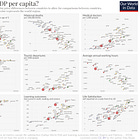#26 What If Trump’s Climate Retreat Is Exactly What the World Needed?
Many see Trump’s rollback as a catastrophe. But could it actually push the world to go even faster?
Welcome to 3X, the publication about living a meaningful life, read by 3000 people every week
Trump is back, and many fear it’s a disaster for climate action. With him in charge, the U.S. will likely slash clean energy funding, revive fossil fuels, and step away from global commitments.
But does this mean the green transition is doomed?
To find out, let's look at what could happen inside the U.S. and how the rest of the world could react.
The U.S. - A Setback, Not a Collapse
Trump is expected to kill climate subsidies, roll back regulations, and revive fossil fuels—just like he did in his first term. The Inflation Reduction Act, which poured billions into clean energy, will likely be gutted.
As bad as this might sound, the transition won’t stop. Texas now produces more wind power than any country except China, Germany and India. California generates enough solar energy to power over 10 million homes. U.S. corporations invested a record $25 billion in clean energy last year—more than many countries' entire energy budgets.
And most importantly? Clean energy is now cheaper than fossil fuels.
Even without Washington’s help, the shift will continue.
Yet, the real question isn’t what happens inside the U.S. It’s what happens everywhere else.
A Shift in Climate Leadership
The U.S. doesn’t just impact the world with its emissions—it shapes global policy, financing, and trade. If Trump pulls back, the world will feel it.
But instead of slowing down, could it revive Europe and further boost China’s clean tech dominance?
China: A Green Superpower in the Making
China already produces 80% of the world’s solar panels and batteries and sells more EVs than the U.S. and Europe combined. Now, with the U.S. retreating, it sees an even bigger opportunity: total dominance in cleantech.
But China isn’t just chasing exports—it’s also trying to fix a massive energy problem at home. As the world’s largest importer of oil and gas, it spends nearly $500 billion a year on foreign fuel, a huge economic risk. To reduce this dependency, it’s rapidly expanding renewables, not just for climate reasons, but to secure its own energy future.
Truth be told, this transition isn’t as clean as it seems. To avoid blackouts, China is still building coal plants at a rapid pace, making it both the biggest investor in renewables and the largest consumer of coal.
Europe’s Crisis Turns Opportunity
Europe doesn’t have a choice. After losing access to cheap Russian gas, it needs a new energy strategy—fast. And not only that - it needs to revive productivity and economic growth.
Welcome EU Green Industrial Plan. Not just a climate plan but a survival strategy. Europe must bet big on clean tech to lower energy costs, create jobs, and secure its future.
But there’s a threat: China’s green tech is too cheap to ignore. Backed by state subsidies, Chinese EVs, solar panels, and batteries are flooding global markets at prices European manufacturers can’t match.
So here’s the dilemma: If Europe lets them in freely, its own clean tech industry could collapse, making it dependent on China for the energy transition. But if it blocks Chinese imports, China could retaliate by cutting off lithium and rare earth metals—critical for Europe’s own EVs, batteries, and wind turbines.
Europe’s move? Invest big in local manufacturing, secure critical materials from new partners, and keep just enough trade with China to avoid disaster.
The Global South, the new “green” battleground
With the U.S. pulling back, China and Europe are racing to win over emerging markets.
China is using its Belt and Road Initiative to fund clean energy projects across Africa, Asia, and Latin America—offering cheap solar and wind while locking countries into Chinese technology.
Europe sees an opening. If it steps up climate financing, it could become the go-to partner for green development, reducing China’s dominance and securing new trade allies and growth.
Power, Not Morality
Trump’s climate rollback will surely have consequences. But likely much less than what many believe.
Inside the U.S., it might slow progress—but not stop it. States, corporations, and market forces will keep clean energy growing.
Globally, China and Europe see a massive opportunity - securing its own energy supply while leading the cleantech industry.
The green transition isn’t slowing down. And the question isn’t whether the world will go green—it’s who will lead it.
Thanks for reading 3x!
If this resonated with you, hit the ❤️ and leave a comment—it means a lot. And if you know someone who’d appreciate it, share it via email, WhatsApp, or on social media. Good ideas are better when shared.
Subscribe just below to stay in the loop. 👇
Related articles




